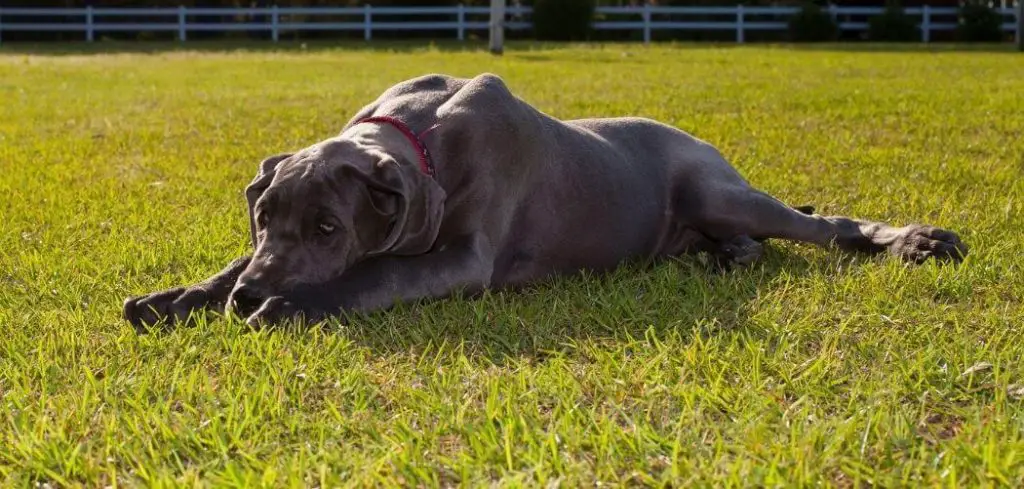It can be worrying to watch a dog constantly eating grass and dirt, especially when it becomes a daily habit rather than the occasional nibble.
While some dogs may do this occasionally without issue, persistent behavior can point to an underlying health or behavioral problem that needs attention.
We outline the common reasons dogs may constantly eat grass and dirt, what you can do at home, and when to seek veterinary help.
Dog Constantly Eating Grass and Dirt — Why It Happens
Dogs may constantly eat grass and dirt due to a mix of nutritional, medical, and behavioral reasons. Some dogs are driven by nutritional deficiencies that push them to seek out minerals or fiber in soil and grass. Others may be experiencing stomach upset, gastrointestinal disease, or parasites that trigger the behavior. In certain cases, anxiety, boredom, or compulsive tendencies play a role.
While it can sometimes seem harmless, persistent grass and dirt eating can lead to vomiting, exposure to harmful substances, or worsening underlying health issues.

Dog Constantly Eating Grass and Dirt: Common Causes
Nutritional Deficiencies
When a dog’s diet lacks certain vitamins, minerals, or fiber, they may turn to grass and dirt as a natural supplement.
Soil can contain trace minerals like iron or zinc, and grass provides roughage that aids digestion.
Owners might also notice dull coat quality, weight fluctuations, or changes in appetite when nutritional imbalances are present.
While commercial dog foods are generally well-balanced, some dogs still develop cravings linked to deficiencies.
Read more: Dog Eating Grass Excessively and Vomiting (Why it happens)
Gastrointestinal Upset
Many dogs eat grass as a way to soothe their stomachs. This can sometimes lead to vomiting shortly afterward.
Dirt eating may occur in dogs experiencing chronic nausea or digestive irritation. Conditions like gastritis, acid reflux, or inflammatory bowel disease may drive this behavior.
Repeated vomiting, diarrhea, or abdominal discomfort should raise concern when combined with compulsive grass or dirt consumption.
Parasites
Intestinal parasites such as roundworms or hookworms can alter a dog’s appetite and cause unusual cravings.
Affected dogs may attempt to eat dirt as a way to ease discomfort or supplement missing nutrients absorbed by the parasites.
Signs often include diarrhea, bloating, weight loss, or dull fur. Left untreated, parasitic infections can become dangerous, particularly in puppies and senior dogs.
Anemia
Dogs with anemia, whether from chronic illness, blood loss, or parasite infestation, may show signs of pica — the urge to eat non-food items like dirt.
This is thought to be a subconscious attempt to replenish missing minerals like iron. Other symptoms may include pale gums, weakness, lethargy, and rapid breathing.
Because anemia can point to serious underlying diseases, this cause requires veterinary testing and immediate attention.
Behavioral Causes (Boredom, Anxiety, or Compulsive Disorder)
Not all cases are medical. Some dogs develop habits of eating grass and dirt due to boredom, lack of enrichment, or anxiety.
Stressful environments, lack of exercise, or inadequate stimulation may lead to compulsive behaviors.
Over time, these habits can become ingrained, and dogs may continue the behavior even if the original trigger has passed.
Owners may also notice pacing, excessive licking, or other anxiety-driven actions alongside grass and dirt consumption.
Toxic Exposure Risks
One overlooked danger is the risk of toxins. Grass treated with pesticides or dirt contaminated with chemicals, fertilizer, or harmful bacteria can make a dog very sick.
Even if the underlying reason is minor, the act of constantly eating grass and dirt exposes dogs to substances that can cause poisoning, diarrhea, or worse.
This makes the behavior especially risky if not managed.
What to Do If Your Dog Is Constantly Eating Grass and Dirt
If a dog frequently consumes grass and dirt, the first step is to monitor the behavior and note any accompanying symptoms such as vomiting, diarrhea, lethargy, or appetite changes.
Providing a well-balanced diet with adequate fiber and nutrients can help reduce cravings linked to deficiencies.
Some owners find success with adding vet-approved supplements or switching to a higher-quality food.
In cases where boredom or stress seems to drive the behavior, increasing mental and physical stimulation can make a difference.
Longer walks, puzzle toys, and training exercises can help redirect energy. Offering safe chewing alternatives can also provide an outlet for oral fixation.
For anxious dogs, creating a calm, predictable environment is important.
Always supervise outdoor time if grass and dirt eating is frequent. Preventing access to chemically treated lawns, garden beds, or contaminated soil is essential.
While some grass eating is common, excessive or compulsive behavior should be addressed quickly to avoid harm.
When to Call or Visit Your Vet
A veterinary visit is necessary if the behavior is constant and especially if it is paired with other concerning signs.
Dogs who vomit repeatedly, develop diarrhea, lose weight, or show lethargy should be seen promptly. Pale gums, coughing, bloating, or labored breathing also signal urgent issues.
If worms or parasites are suspected, stool testing and treatment are needed. Bloodwork may be required to check for anemia, nutrient deficiencies, or chronic disease.
In cases of behavioral causes, a vet may recommend training support or anxiety management. Because constant grass and dirt eating can expose dogs to toxins and sharp objects, veterinary input ensures no underlying condition is missed.
Read more: Dog Eating Grass Frantically Middle of Night (What it mean)
Key Takeaway
Constantly eating grass and dirt is more than just a quirky habit in dogs — it can signal nutritional deficiencies, stomach upset, parasites, or even behavioral issues.
Some cases may seem harmless, but persistent behavior deserves attention to protect a dog’s health and prevent exposure to toxins.
Owners can help by providing balanced nutrition, enrichment, and safe outdoor supervision.
When in doubt, consulting a veterinarian is the best step to uncover and address the root cause while keeping a dog safe and healthy.
